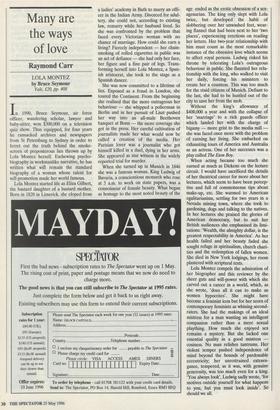Many are the ways of love
Raymond Carr
LOLA MONTEZ by Bruce Seymour Yale, £20, pp. 408 In 1990, Bruce Seymour, air force officer, wandering scholar, lawyer and baby-sitter, won $300,000 on a television quiz show. Thus equipped, for four years he ransacked archives and newspapers from St Petersburg to Sydney in order to ferret out the truth behind the smoke- screen of preposterous lies thrown up by Lola Montez herself. Eschewing psycho- biography in workmanlike narrative, he has written what will remain the standard biography of a woman whose talent for self-promotion made her world famous.
Lola Montez started life as Eliza Gilbert, the bastard daughter of a bastard mother. Born in 1820 in Limerick, she eloped from a ladies' academy in Bath to marry an offi- cer in the Indian Army. Divorced for adul- tery, she could not, according to existing law, remarry while her husband lived. So she was confronted by the problem that faced every Victorian woman with no chance of marriage. How could she earn a living? Fiercely independent — her chain- smoking of rolled cigarettes in public was an act of defiance — she had only her face, her figure and a fine pair of legs. Trans- forming herself into Lola Montez, a Span- ish aristocrat, she took to the stage as a Spanish dancer.
She was now committed to a lifetime of lies. Exposed as a fraud in London, she toured the Continent. From the beginning she realised that the more outrageous her behaviour — she whipped a policeman in Berlin and in her pursuit of Liszt pushed her way into an all-male Beethoven banquet at Bonn — the more coverage she got in the press. Her careful cultivation of journalists made her what would now be called a creation of the media. Her Parisian lover was a journalist who got himself killed in a duel, dying in her arms. She appeared as star witness in the widely reported trial for murder.
When she turned up in Munich in 1846 she was a famous woman. King Ludwig of Bavaria, a conscientious monarch who rose at 5 a.m. to work on state papers, was a connoisseur of female beauty. What began as homage to the most noted beauty of the age ended as the erotic obsession of a sex- agenarian. The king only slept with Lola twice, but developed the habit of slobbering over her unwashed feet, wear- ing flannel that had been next to her 'two places', experiencing erections on reading her letters. Her two-year relationship with him must count as the most remarkable instance of the obsessive love which seems to affect royal persons. Ludwig risked his throne by tolerating Lola's outrageous behaviour in public. She flaunted her rela- tionship with the king, who walked to visit her daily, forcing his ministers to create her a countess. This was too much for the staid citizens of Munich. Defiant to the last, she had to be hustled out of the city to save her from the mob.
Without the king's allowance of $400,000 a year and with the collapse of her 'marriage' to a rich guards officer which landed her with the charge of bigamy — more grist to the media mill — she was faced once more with the problem of earning her living. She embarked on exhausting tours of America and Australia as an actress. One of her successes was a play called The Eton Boy.
When acting became too much she earned as much as Dickens on the lecture circuit. I would have sacrificed the details of her theatrical career for more about her lectures, which seem to have been percep- tive and full of commonsense tips about make-up, etc. She warmed to American egalitarianism, settling for two years in a Nevada mining town, where she took to gardening, dogs and talking to the natives. In her lectures she praised the glories of American democracy, but to suit her British audiences she emphasised its limi- tations: 'Wealth, the almighty dollar, is the greatest respectability in America'. As her health failed and her beauty faded she sought refuge in spiritualism, church chari- ties and the redemption of fallen women. She died in New York lodgings, her room plastered with scriptural texts.
Lola Montez compels the admiration of her biographer and this reviewer by the sheer guts and will-power with which she carved out a career in a world, which, as she wrote, 'does all it can to make us women hypocrites'. She might have become a feminist icon but for her scorn of contemporary feminists as whining second- raters. She had the makings of an ideal mistress for a man wanting an intelligent companion rather than a mere sexual plaything. How much she enjoyed sex remains a mystery. But she lacked one essential quality in a good mistress — cosiness. No man relishes tantrums. Her violent temper pushed independence of mind beyond the bounds of pardonable eccentricity; her unrestrained extrava- gance, tempered, as it was, with genuine generosity, was too much even for a king. 'You always look', Ludwig sadly wrote, 'for motives outside yourself for what happens to you, but you must look inside'. So should we all.


























































 Previous page
Previous page